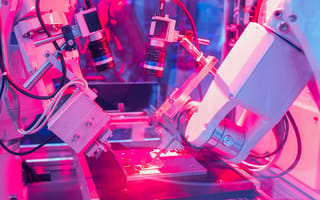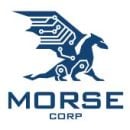Applying artificial intelligence to robotics is all about furthering innovation. These intelligent machines include self-driving cars, autonomous drones, humanoid robots and autonomous farming equipment with applications for a variety of industries from retail and healthcare to agriculture and defense. They make use of sensors, computer vision technology, machine learning and other AI technologies to perform functions like navigating warehouses and sorting recyclables.
What Is AI Robot Technology?
Artificial intelligence is a branch of computer science that seeks to develop technology to simulate the workings of the human brain. Combined with the field of robotics, AI has been used to develop and innovate intelligent machines that can be used for everything from manufacturing to assisting healthcare providers.
Demand for AI-enabled robotics has been driving substantial growth in the industry. The AI robotics market is expected to reach a worth over $33 billion by 2030, according to Markets and Markets.
From making smart consumer products to creating the first human-like artificial brain, the following companies are doing dazzling things with AI robots.
Top Companies Using AI Robot Technology
- Symbotic
- Fanuc
- Tesla
- Amazon
- Hanson Robotics
- Starship Technologies
- iRobot
- Boston Dynamics
AI Robotics Companies to Know
Location: Waltham, Massachusetts
Founded: 1992
Boston Dynamics’ Spot is a mobile, dog-like robot that “has an inherent sense of balance and perception,” incorporating a form of AI the company refers to as “athletic intelligence.” Spot can be used for industrial inspections, allowing customers to use the robot remotely to navigate terrain that might be difficult or hazardous. Boston Dynamics also develops Stretch, an arm-like robot for warehouse operations like package movement and unloading.
Location: Seattle, Washington
Founded: 2018
Carbon Robotics supplies the agricultural industry with innovative tools, like the Autonomous LaserWeeder, helping farmers reduce time spent weeding. The product employs hi-resolution cameras that identify crops and weeds in real-time and kill weeds — with lasers — at the meristem. The product is designed to function properly no matter the weather conditions or time of day.
Location: Waltham, Massachusetts
Founded: 1998
Vecna Robotics provides autonomous mobile robot (AMR) systems and orchestration software to automate material handling in warehouses and manufacturing facilities. Its product line includes autonomous forklifts, autonomous tuggers and cobots, designed for warehouse workflows like picking and putaway, cross-docking and point-to-point transport.
Location: Costa Mesa, California
Founded: 2017
Anduril is an aerospace and defense tech company that makes software for unmanned aircrafts and vehicles that can be operated remotely. By combining robotics and software capabilities, the company facilitates complex intelligence, surveillance and reconnaissance missions that are conducted without risk to human life.
Location: Boston, Massachusetts
Founded: 2015
Piaggio Fast Forward develops a cargo-carrying robot that helps transport groceries, luggage and more. The company’s gita robot uses AI to follow its owner close behind, acting as a versatile, hands-free carrier.
Location: Palo Alto, California
Founded: 2003
Tesla develops and deploys autonomous systems in its robots and vehicles. The company manufactures Tesla Optimus, a general-purpose, bi-pedal humanoid robot capable of performing various repetitive tasks. Tesla also builds AI inference chips and neural network systems to run its self-driving software and safety features in Tesla vehicles.
Location: Colorado Springs, Colorado
Founded: 2022
True Anomaly offers hardware and software solutions that combine AI and spacecraft technologies to improve the aerospace industry. The company’s AI co-pilot assists human operators with planning, simulating and carrying out missions. It aims to bolster the operational capabilities of the United States, its allies and commercial partners.
Location: Hong Kong, China
Founded: 2013
Hanson Robotics creates AI robots that not only have a human appearance, but also operate with human-like characteristics. These AI robots have life-like skin made of Hanson’s proprietary nanotechnology called Frubber and their human-like features include eye contact, facial recognition, speech and the ability to hold natural conversations. The robots can produce high-quality expressions that offer a less mechanical robotic experience.
Location: Pasadena, California
Founded: 2016
Miso Robotics creates AI robots for use in commercial kitchens. Its fry station robot Flippy 2 uses AI vision to recognize what kind of food employees have placed in its auto bin. Miso says the robot can perform more than twice as many food prep tasks compared to the original Flippy model.
Location: Cambridge, Massachusetts
Founded: 2014
MORSE builds autonomous aerial vehicles designed to deliver unique payloads, offer long-range resupply and provide guided cargo delivery for missions regarding U.S. national security. The company’s technology enables navigation in GPS-denied environments. Its vehicles’ capabilities also include alternative positioning, timing and more.
Location: Austin, Texas
Founded: 2017
Diligent Robotics uses AI to build robotic assistants for the healthcare industry. The company’s Moxi robot is able to deliver medication and lab samples, and it’s equipped with a robotic arm that allows for navigating doors and elevators.
Location: New York, New York
Founded: 2020
Dandy is a fully digital dental lab that uses artificial intelligence and robotics to power its manufacturing workflows and patient-specific designs. It offers 3D printing capabilities for full or partial dentures and night guards, and Dandy collects large datasets of annotated 3D dental scans to inform its models.
Location: Los Angeles, California
Founded: 2019
Machina Labs is a robotics company using AI to enable advanced manufacturing operations across industries like aerospace and defense. The company’s Robotic Craftsman platform relies on AI to power precise control for processes such as shaping sheet metal, drilling holes and polishing surfaces.
Location: Louisville, Colorado
Founded: 2015
AMP puts AI to work to automate recycling. The AI platform that powers the company’s robotic sorting system is able to recognize recyclable materials and distinguish types of plastics, papers and metals.
Location: Wilmington, Massachusetts
Founded: 2014
Locus Robotics produces autonomous mobile robots to support warehouse operations. The Locus Max, for example, has a payload capacity of up to 3,000 pounds, while the Locus Origin comes equipped with 8 cameras and sensors so that it can maneuver to work on order fulfillment alongside human counterparts.
Location: San Francisco, California
Founded: 2014
Starship creates autonomous robots that help to deliver items within a 4-mile radius. These AI robots are able to take items like groceries, food delivery orders or retail store orders and deliver them to customers using artificial intelligence to navigate their route.
Location: San Diego, California
Founded: 2009
Brain Corp’s proprietary technology makes AI robots adaptable and flexible so they can navigate unstructured environments like warehouses and store floors. The robots also have mapping, routing, surface anomaly detection, object avoidance and cloud-based data capture capabilities. EMMA, a Brain Corp robot, was tested in Walmart stores for after-hour floor cleaning.
Location: Austin, Texas
Founded: 2016
Apptronik builds robots that are designed with dexterity and safety features that enable them to function alongside human workers. The company uses technology like machine learning to develop humanoid robots that can handle difficult-to-fill jobs in industries like logistics and construction.
Location: Bedford, Massachusetts
Founded: 1990
iRobot uses AI in engineering home robots like the Roomba robot vacuum and Braava mopping robots. With the Roomba, users can schedule the robot to continue cleaning while they’re gone, and the Braava robots can be directed to clean with voice commands. The company’s proprietary technology also guides the robots around obstacles while they clean.
Location: Zürich, Switzerland
Founded: 1988
While ABB delivers a variety of products for manufacturing and commercial customers, the company has also provided AI and robotics solutions. ABB has developed a robotic Item Picker that operates with the help of machine vision and AI, which determine the ideal point for the Item Picker to grasp an object. As a result, the Item Picker can ramp up businesses’ productivity, handling as many as 1,400 items per hour.
Location: Irvine, California
Founded: 2015
CloudMinds operates robots with a secure cloud network — or ‘cloud brain’ — that possesses natural language processing, computer vision and other AI abilities. The company’s Cloud Pepper leverages this technology to hold conversations with human customers in multiple languages while the Cloud Delivery Robot relies on its cloud brain to navigate different environments and map efficient routes.
Location: Wilmington, Massachusetts
Founded: 2007
Symbotic provides organizations with a comprehensive software platform that can orchestrate the collective movements of an entire robot fleet. Through the use of artificial intelligence, the platform simultaneously connects to robotic arms, autonomous robots and other types of machines. Users of Symbotic’s platform can then coordinate different actions through controls and algorithms while collecting data to inform their processes.
Location: Santa Clara, California
Founded: 1993
Nvidia plays a role in robotics by providing AI and computing platforms necessary to build, test and deploy autonomous machines, ranging from industrial robots to humanoid robots. The company’s three-computer solution enables robots to see, learn, perceive their surroundings and make decisions in real time. Nvidia also provides robotics solutions such as simulation-based learning, synthetic data generation and industrial digital twins.
Location: Seattle, Washington
Founded: 1994
Amazon Robotics, a subsidiary of Amazon, builds autonomous robotic systems to improve efficiency across the company’s fulfillment centers and delivery stations. Its technology, such as the AI foundation model DeepFleet and robots like Blue Jay and Vulcan, enables employees to focus on complex tasks while robots handle sorting, lifting and carrying packages.
Location: Gardena, California
Founded: 2020
GrayMatter Robotics develops robotics and AI-based software to assist manufacturing operations. More specifically, the company strives to simplify tedious tasks by building AI brains for commercial robots. The company’s first development, Scan&Sand, is a floor operator that uses sensors to sand materials consistently.
Location: Rochester Hills, Michigan
Founded: 1972
Fanuc is a major producer of robotic products for manufacturers, with a portfolio that includes lasers, robodrills and cobots. The company also equips its products with AI-based capabilities. For example, Fanuc added an AI path control function that enhances the precision of its robots by combining machine learning with acceleration sensors to help robots improve their movements over time.
Frequently Asked Questions
What are AI robots?
AI robots are machines that use sensors and other AI technologies to perform tasks like assembling products, retrieving items and navigating urban environments for package delivery. These robots may take on various forms, ranging from robotic arms to self-driving cars.
What is the most famous AI robot?
Sophia, created by Hanson Robotics, is perhaps one of the most famous AI robots due to her advanced capabilities. She has made numerous appearances in media, including The Tonight Show and a music video for Leehom Wang’s “A.I. Love.”
What is the largest AI robotics company?
Symbotic and Fanuc are two of the largest AI robotics companies in the world in terms of market capitalization.
























